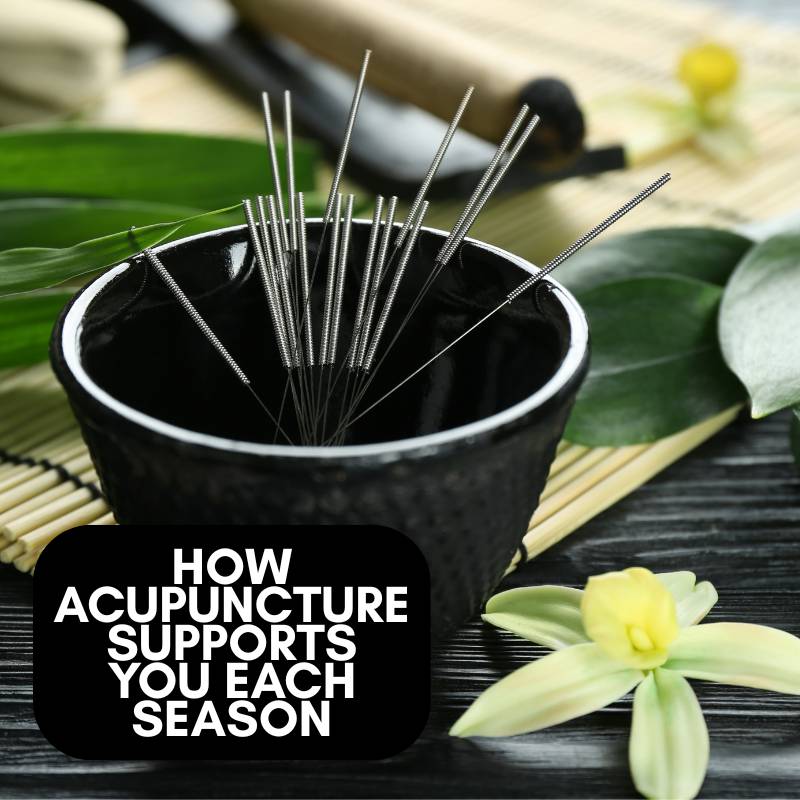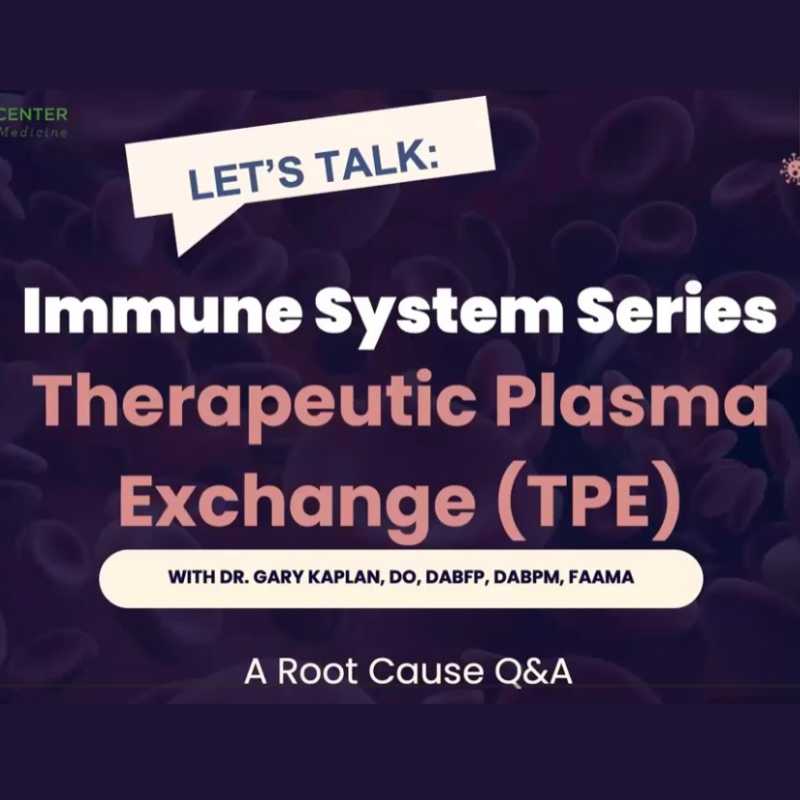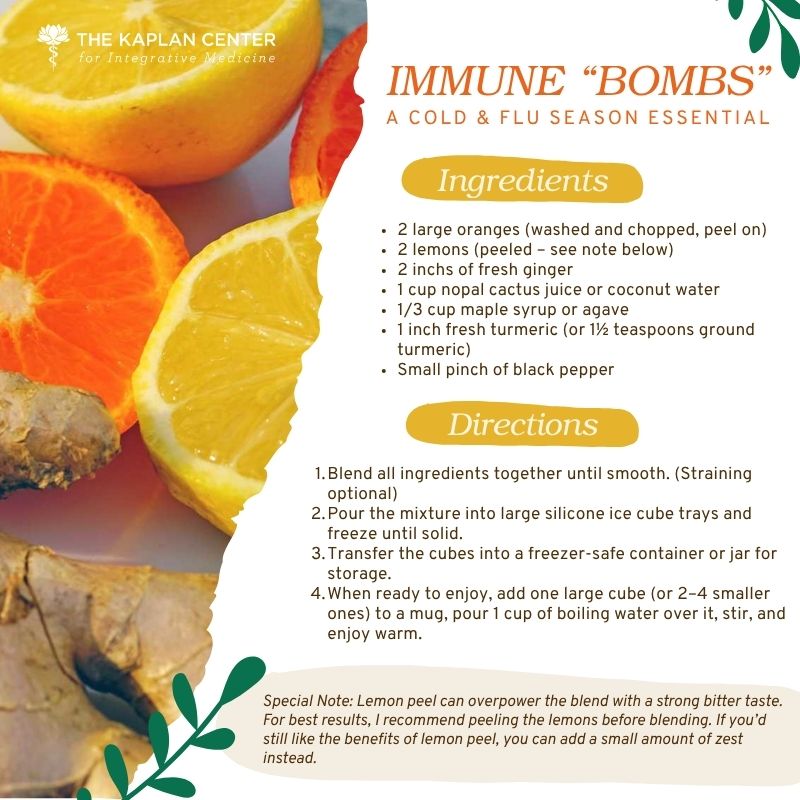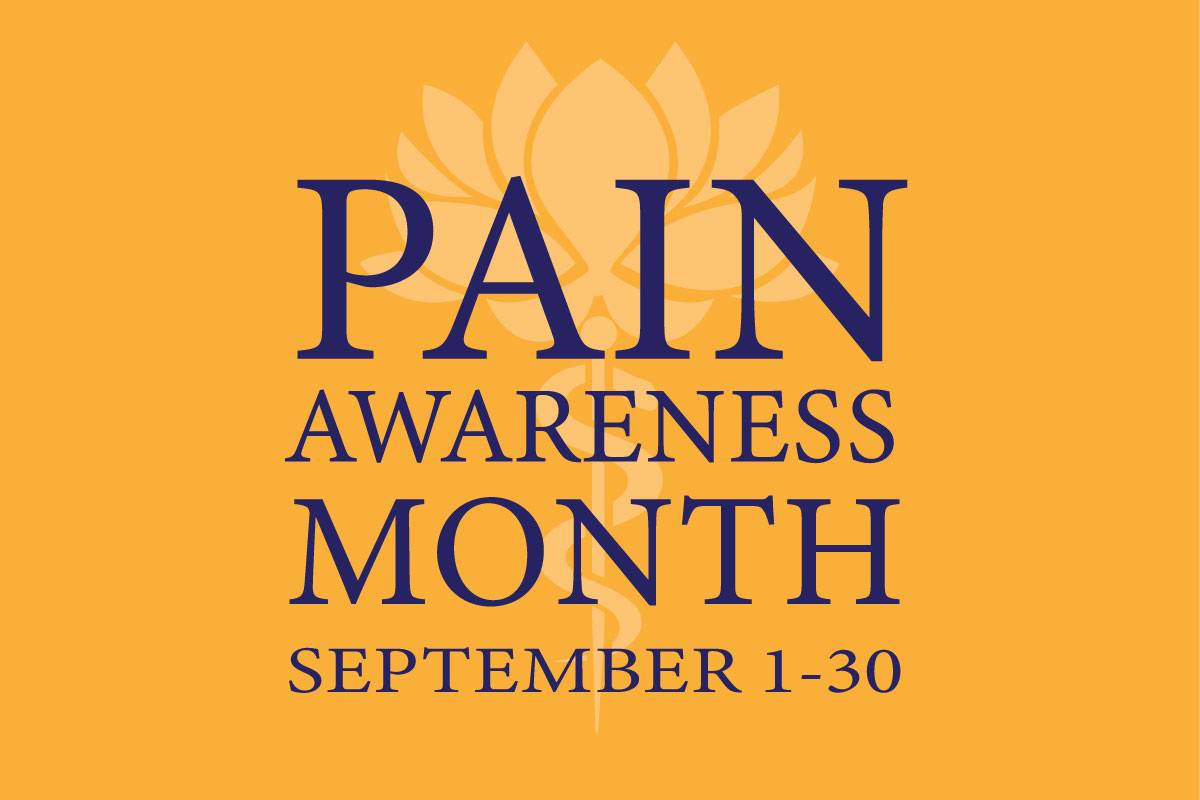
Balance Through the Seasons: Insights from Acupuncture
December 16, 2025/by Rebecca Berkson, L.Ac, Dipl.OM
5 Ways We Can Keep Your Immune System Strong
December 10, 2025/by Kaplan Center
Want to Take Your Workout to the Next Level Next Year? These Tips Can Help
December 8, 2025/by Kaplan Center
Dr. Kaplan’s Dos and Don’ts of the Holiday Season
December 3, 2025/by Kaplan Center
Let’s Talk Webinar – A Root Cause Q&A
December 2, 2025/by Kaplan Center
Navigating Holiday Meals with Gut Issues: Simple Tips for a Comfortable Season
December 1, 2025/by Chardonée Donald, MS, CBHS, CHN, CNS, LDN
Craniosacral Therapy for TMJ | Say Goodbye to the Daily Grind
November 19, 2025/by Patricia Alomar, M.S., P.T.
From Compassionate Care to Personal Healing: A Letter to My Patients
November 18, 2025/by Kaplan Center
8 Steps to a Healthier Gut—and a Longer, Healthier Life
November 18, 2025/by Kaplan Center
Mid-Life Irritability & Fatigue Improved by Hormonal Balancing
November 13, 2025/by Lisa Lilienfield, MD
From Challenges to Change: Dr. Kaplan on Healthcare’s Biggest Challenges
October 29, 2025/by Kaplan Center
Overlooked Dangers of Mold Exposure and How to Stay Safe – Dr. Kaplan Talks to WUSA9
October 27, 2025/by Kaplan Center
Let’s ‘Fall’ Into Wellness: A Nutritionist-Approved Immune-Boosting Recipe for Cold and Flu Season
October 13, 2025/by Chardonée Donald, MS, CBHS, CHN, CNS, LDN
PANS/PANDAS – When Sudden Symptoms Signal Something More
October 9, 2025/by Kaplan Center
Beating Burnout, A Nutritionist’s Perspective
October 1, 2025/by Chardonée Donald, MS, CBHS, CHN, CNS, LDN
3 Things That Can Happen After Stopping GLP-1s
September 11, 2025/by Chardonée Donald, MS, CBHS, CHN, CNS, LDN
What Families Need to Know About COVID and Flu Season
September 3, 2025/by Kaplan Center
September is Pain Awareness Month
September 1, 2025/by Kaplan Center
Dr. Kaplan Spoke to Northern Virginia Magazine About COVID, Flu, and Immunity — Here’s What You Should Know
August 14, 2025/by Kaplan Center
“Why Do I Feel Like Crap?”: The Overlap Between Long COVID and Perimenopause
July 30, 2025/by Kaplan CenterAre you looking to improve your overall wellness?
Personalized care you can trust.
Our integrative, non-surgical treatment approach is highly successful in maintaining wellness and also treating chronic pain and illness. For more than 30 years, we have delivered superior, cutting-edge health care in the Washington, DC area.
QuickLinks
Contact Information
Tel: 703-532-4892
Fax: 703-237-3105
6829 Elm Street, Suite 300
McLean, Virginia 22101
Map It
Hours of Operation
Mon – Thu : 8 am – 5 pm, ET
Fri : 8 am – 12 pm, ET
What I Know About Healing Chronic Pain From 37 Years Of Treating Patients
/in Long Covid, Wellness/by Gary Kaplan, DOThere are over 50 million adults in the United States living with some form of chronic pain. The impact of chronic pain on people’s lives is enormous; unfortunately, despite modern medical advances we’re still not that great at treating it.
We may be unsuccessful in treating chronic pain because the way we’ve thought about where it comes from is all wrong. Research demonstrates that chronic pain is frequently a symptom of inflammation in the brain. Finding a cure requires that we identify and treat all the things that are causing the brain to remain in an inflamed state.
Here are seven things you need to do to effectively to deal with your chronic pain:
1. Get a real diagnosis.
Chronic pain, in and of itself, is not a diagnosis. It’s a symptom of injury or illness, and even more specifically, it’s a symptom of inflammation. For example, over the course of 37 years of practicing family medicine and treating patients suffering from chronic pain, the worst case of acute shoulder pain I have ever seen was in a man who was having a heart attack.
I also have seen patients complain of chronic lower back pain, when their underlying problem was actually Crohn’s disease (an autoimmune disease that causes digestive problems).
Similarly, chronic migraine headaches may be a symptom of a food allergy. When this is the case, eliminating the offending foods can be a straightforward solution.
Today, we are seeing more and more people experiencing pain symptoms as a result of a previous COVID-19 infection. Long-COVID Syndrome symptoms often mimic the pain symptoms of fibromyalgia, ME/CFS and POTS.
Getting the right diagnosis requires a comprehensive history by a physician who can connect the dots. Frequently, what you think is the beginning of your pain problem is not its actually cause.
Bottom line: you must know what to treat if you have any hope of finding a cure.
2. Get tested for sleep disorders and get enough rest.
If you’re getting seven or more hours of sleep per night, but you still feel exhausted all the time, you may have sleep apnea. Sleep apnea is a condition that means that while you’re sleeping you periodically stop breathing. During these intervals, your brain is deprived of oxygen, which causes inflammation of the neural tissue in the brain. Sleep apnea affects approximately 5% of Americans and it has been estimated that as many as 85% of people with this condition have not been diagnosed.
The inflammation caused by sleep apnea can cause or contribute to joint pain, migraine headaches, abdominal pain, and other chronic pain conditions. Ask your doctor about getting tested for sleep apnea or other sleep disorders. Sleep well and you’ll find you have more energy and less pain.
3. Eat an anti-inflammatory diet.
To eliminate the dietary causes of chronic pain, I usually recommend that patients limit their food intake to rice, fish, chicken, and fresh fruits and vegetables for a period of six weeks. While this food plan doesn’t eliminate every possible allergen, it does eliminate the major offenders, such as gluten, milk and milk products, refined sugar, processed foods, nuts and eggs.
When you eat, notice if certain foods cause you to experience an adverse reaction such as a stuffy nose, fatigue, headache, bloating, or gas. By eliminating the foods that create inflammation in your brain and body, you’ll find that your pain decreases and your physical energy and mental clarity increase.
4. Meditate.
Studies show that regular meditation improves brain function and can help the brain recover from inflammatory damage. Regular meditation also has been shown to improve our ability to tolerate and recover from stress. Meditate for 20 to 30 minutes a day and see if you notice a difference.
5. Make time for manual therapy.
Hands-on therapies such as Osteopathic Manipulative Medicine (OMM), physical therapy, massage, and chiropractic therapy can help relieve, and in some cases, completely resolve chronic musculoskeletal pain.
Whatever the pain’s origin — whether its disease, traumatic injury or overuse, or emotional stress — bodywork can help stimulate healthy blood flow into damaged muscles, tendons, and connective tissue, thereby relieving musculoskeletal pain and tension and stimulating the body’s own ability to heal itself.
In fact, manual therapy is so effective in unlocking the emotional stress and trauma stored in our bodies that I often also recommend working with a psychotherapist who can help you process these issues.
6. Take nutritional supplements that are right for you.
There are supplements on the market that can help address generalized inflammation and joint pain. Supplements are also a great way to strengthen your immune system and help keep you healthy. However, before you start taking any new product, make sure you are buying from a trusted supplier; the U.S. Food & Drug Administration does not regulate the manufacture and marketing of supplements as they do with prescription medication.
Talk with your doctor about the medications and other supplements you are already taking before starting a new supplement because some products can cause drug interactions.
7. Practice gratitude.
Although this is sometimes a lot to ask of people whose lives have been devastated by chronic pain, the cultivation of gratitude for family and friends and the other gifts in our lives helps make us more trusting, altruistic, resilient, and just plain happier. It also allows us to live each day more fully.
I recommend keeping a gratitude diary and listing five things for which you are grateful each day. Other gratitude exercises include visualizing and writing about your future, best possible self; putting your gratitude into action by writing a thank-you note or visiting a person to whom you owe a debt of gratitude. Spending time each day contemplating the things for which you are grateful is likely to help reduce not only your stress level but also your experience of physical pain.
Good luck on your healing journey!
We are here for you, and we want to help.
Our goal is to return you to optimal health as soon as possible. To schedule an appointment please call: 703-532-4892 x2
The Kaplan Center named one of Arlington Magazine’s 2022 Best Places to Work
/in Press/by Kaplan CenterDr. Kaplan to speak at upcoming conferences
/in Event/by Kaplan CenterDr. Kaplan’s presentation, Is Post-Treatment Lyme Disease an Autoimmune Encephalopathy of Infectious Etiology, Persistence of Bugs or Both? will be on Friday, September 23rd.
About the conference: The mission of ILADS is to educate healthcare professionals about the appropriate diagnosis and treatment of tick-borne diseases. This event is intended for medical professionals including MDs, DOs, NDs, PAs, NPs, RNs, LCSWs, DCs, PhDs, psychologists, and other professionals assisting Lyme and related disease patients.
For more information, visit: https://www.ilads.org/ilads-conference/orlando-2022/.
Dr. Kaplan’s presentation will be on Autoimmune Encephalopathy of Infectious Etiology.
Other topics include:
This one-day, integrative wellness event, Maximizing Longevity – The Future of Precision Wellness will be held on Saturday, October 1,2022 in Holmdel, NJ.
This event is for licensed medical professionals. For more information or to register, visit https://events.vibrant-america.com/new-jersey/.